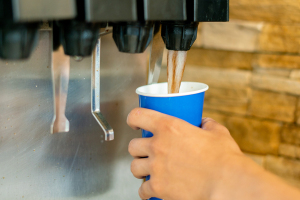by
John R. Fischer, Senior Reporter | September 03, 2019

A new study says gadolinium from contrast
agents can be found in soda and
tap water
Remnants of contrast-based gadolinium used in MR exams are present in everyday tap water and soft drinks served to patrons in restaurants, say researchers at Jacobs University Bremen in Germany.
The team made the finding after identifying the rare earth element in rivers worldwide, and are claiming that its presence is actually useful, and not harmful.
“The presence of gadolinium contrast agents reveals the presence of waste water-derived substances in a sample; such compounds may be toxic at low concentrations, acting as endocrine disruptors,” Dr. Michael Bau, professor of geoscience at Jacobs University Bremen, told HCB News. “The Gd contrast agents themselves come at such low concentrations that they do not impose any health risk. So it is actually a very useful tracer for waste water-derived substances, and it would NOT be beneficial to remove them from the water.”



Ad Statistics
Times Displayed: 131826
Times Visited: 7470 MIT labs, experts in Multi-Vendor component level repair of: MRI Coils, RF amplifiers, Gradient Amplifiers Contrast Media Injectors. System repairs, sub-assembly repairs, component level repairs, refurbish/calibrate. info@mitlabsusa.com/+1 (305) 470-8013
Following MR exams, patients excrete gadolinium in the hospital or at home from their kidneys, with the agent making its way through the sewage system to local waste water treatment plants. Waste water treatment processes, however, are unable to remove it, allowing gadolinium to be part of the produced clear water that enters rivers and lakes. These bodies of water empty into seas and build up ground water, making the gadolinium part of available sources of drinking water.
Initially examining tap water in Berlin, Essen, Cologne and London, the team expanded its study to include water in Bremen, Düsseldorf, Dresden, Karlsruhe, and Munich. Tap water in Berlin was found to be the most contaminated, with 99 percent of the gadolinium determined to be from contrast agents. The amount has also continued to increase over the past years, a trend expected to continue with the rising number of MR scans.
The contrast agent accounted for 31 percent of gadolinium in tap water in downtown Bremen, 34 percent in Karlsruhe, 63 percent in Dresden, 85 percent in Düsseldorf, and 91 percent in Munich. In addition, the researchers examined soft drinks served at well-known fast food franchises in Berlin, Dresden, Düsseldorf, Essen, Karlsruhe and Munich, finding high amounts of the element that were derived from the contrast agent.
Rather than be concerned about drinks containing contrast-based Gd, Bau says people should instead turn their attention to the real danger: xenobiotics.
“In general, removal of xenobiotics (pharmaceuticals, personal care products) from sewage will cost an awful lot of money. So I doubt that this will be feasible,” he said. “We rather need simple measures, such as the general understanding that pharmaceuticals should not be disposed of through the toilet but via normal waste, so that they are incinerated. The general use of pharmaceuticals should be reduced to a minimum.”
The findings were published in the journal,
Science of the Total Environment.

